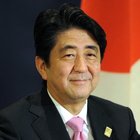Prime Minister of Japan Shinzo Abe (retranslated): Mr President, colleagues,
I would like to thank all those who came here today on the occasion of Vladimir’s visit to Japan, Japanese officials and representatives of Japanese and Russian business.
This year, many high-level visits took place between the two countries, including visits by the Speakers of Russia’s State Duma and Federation Council, and reciprocal visits by the ministers present here, and others.
One of the factors that contributed to this positive trend is the economy.
When I talk about Japanese-Russian relations, I usually say “bilateral relations with the most enormous opportunities” because I am confident that the two neighbouring countries, Japan and Russia, have great potential for cooperation, which has yet to be tapped in certain areas.
I believe that it is our duty, as leaders of the two countries, to exploit the potential of Japanese-Russian relations, which is why when we met in May in Sochi, I decided to propose a cooperation plan to Vladimir that involved eight directions aimed at enhancing the economy and improving the lives of ordinary people.
This cooperation plan is based on the business relationship built through the efforts of our colleagues from the two countries present here today. Thanks to them, this cooperation plan has the ability to benefit the Japanese and the Russians.
For example, in a recent address to the Federal Assembly, while listing goals in the field of medicine, the President noted the needs associated with advanced medicine, higher quality of medical personnel, telemedicine and others.
The cooperation plan includes the Increasing Healthy Life Expectancy direction; within this track, we will hold consultations and define specific steps.
In addition, I would like to note how important it is that Japanese companies provide quality employment on the Russian labour market; they have already created about 13,000 jobs. Also, as more Japanese companies enter the Russian market, we can expect more improvements in the lives of ordinary people.
It has been seven months since I proposed the cooperation plan. During this period, we have elaborated on specifics of the plan uncommonly fast, with active involvement of the interested companies from the two countries. The outcome is that today we welcome more than 60 projects. Later, at the document exchange ceremony, we will confirm these projects as a result of Vladimir’s visit to Japan.
I would like to talk briefly about the Intergovernmental Commission on Trade and Economic Issues. This commission supports the development of Russian-Japanese economic relations under the auspices of its chairpersons, Foreign Minister Kishida and Mr Shuvalov. The commission discussed enhancing our economic ties and, as a result, 12 intergovernmental documents formalised our agreements. Today we are confirming them as our results.
I would like to take the opportunity to express my sincere gratitude to all colleagues from the business community for their work and assistance in outlining the eight-point plan of cooperation and achieving results. Thank you.
It can be expected that our economic relations based on this cooperation plan will expand with more specific objectives and a larger number of projects. Yesterday, Vladimir and I came to the unanimous conclusion that we must develop our bilateral relations after the President’s visit to Japan in line with this thinking.
Among those present today are ministers interested in this cooperation in eight areas. I count on having a discussion about the future of bilateral relations with the business community in the context of the achieved results.
Also, considering the importance of the bilateral inter-regional exchanges, the guests today include the Governor of Hokkaido Ms Takahashi and the Governor of Miyagi Mr Murai.
Now let me introduce President of the Russian Federation Vladimir Putin, who is visiting Japan for the first time in 11 years.
President of Russia Vladimir Putin: Mr Prime Minister, colleagues,
Yesterday, we held detailed talks with Mr Prime Minister in Nagato; we discussed the state of the entire range of Russian-Japanese relations, including political issues and the possibility of signing the peace treaty. I would like to thank you and your colleagues for the very warm atmosphere that was created during our work yesterday.
It is now possible to conduct a more detailed conversation on issues of trade, economic and investment cooperation with representatives from governments and business communities. I suppose it is this kind of work, along the economic track, that will help create the foundation needed to launch truly partner-like relations between our countries.
The economies of Russia and Japan are basically complementary and have few competitive conflicts. As Mr Abe has just said, we have to work to unlock the potential of our bilateral ties. The action plan, suggested by Mr Prime Minister that includes projects in eight main areas, and our proposals on high-priority projects, can serve as a good foundation for this.
The governments of both countries have already prepared a concise list of joint initiatives in such areas as the power-generating sector, industry, medicine, agriculture, and for small and medium-sized businesses. I hope that today’s dialogue will help us discuss the current state of affairs in detail and chart new goals for cooperation.
<…>

